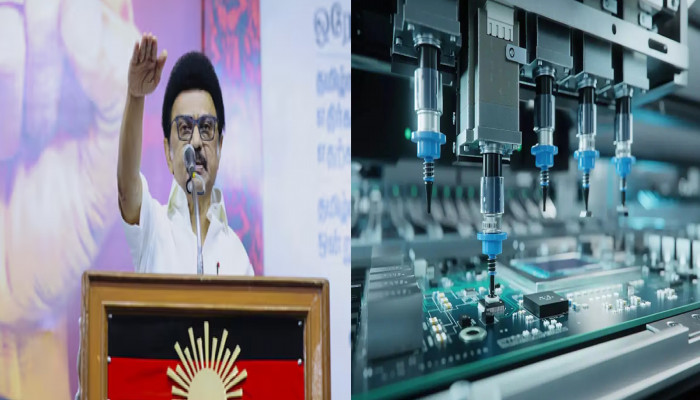Tamil Nadu unveils India’s first state electronics component manufacturing initiative
- In Reports
- 04:20 PM, Apr 30, 2025
- Myind Staff
On Wednesday, Tamil Nadu became the first state in India to launch a special scheme focused on electronics component manufacturing. This initiative is expected to bring in investments of Rs 30,000 crore and create job opportunities for more than 60,000 people.
The Tamil Nadu government has launched a new scheme to boost electronics component manufacturing in the state. Under this scheme, the state will give matching grants to support the incentives already offered by the central government through its Electronics Component Manufacturing Scheme. Chief Minister M. K. Stalin introduced the Tamil Nadu Electronics Components Manufacturing Scheme on Wednesday. This policy is designed to help component makers who are eligible for the central government’s scheme. It aims to attract big investments and create jobs by helping Tamil Nadu’s electronics sector grow and move up the value chain. This scheme comes at a time when Tamil Nadu’s electronics exports have seen a big jump, from $1.66 billion in the financial year 2021 to over $14.6 billion in FY25. With this growth, Tamil Nadu has become the top state in India for electronics manufacturing exports. By offering matching incentives to those approved under the national scheme, the state hopes to increase investment impact and promote advanced manufacturing in important areas of the electronics sector.
“We are proud to announce India’s first state-level matching-grant scheme for electronics. The Tamil Nadu Electronics Components Manufacturing Scheme is a strategic leap forward and a statement of intent that we are backing ambition with policy. We are sending a clear message to global and domestic investors that Tamil Nadu is the most committed and capable partner in India’s electronics growth story,” said TRB Rajaa, Minister of Industries, Government of Tamil Nadu.
“With the scheme, Tamil Nadu becomes the first state in India to put skin in the game by matching Union government incentives. With the state already accounting for 41.23 per cent of India’s electronics exports, this scheme will help us attract further investments in the sector, and not only create new high-value jobs but also embed deep capabilities in our electronics components industrial landscape, enabling us to achieve our mission of $100 billion in electronic exports,” Rajaa added.
The government wants to grow into more advanced and high-value sectors and take control of the full supply chain. This plan matches Tamil Nadu’s larger policy goals, especially the Tamil Nadu Semiconductor and Advanced Electronics Policy (2024). The scheme aims to attract top global and Indian companies in specialised areas like HDI (high-density interconnect) or MSAP (modified semi-additive process) boards, display units, camera parts, lithium-ion batteries, tiny SMD components, and machines used in making electronics.
“The matching-grants scheme is carefully structured to mirror the Union’s electronic components scheme, with targeted support for the same segments — including sub-assemblies, bare components, capital equipment, and supply chain infrastructure. By offering a matching grant, we are ensuring that Tamil Nadu remains competitive in attracting these high-value, capital-intensive projects. This approach creates predictability and scalability for investors while reinforcing our policy focus on deep value-chain integration and ecosystem development,” he said.







Comments